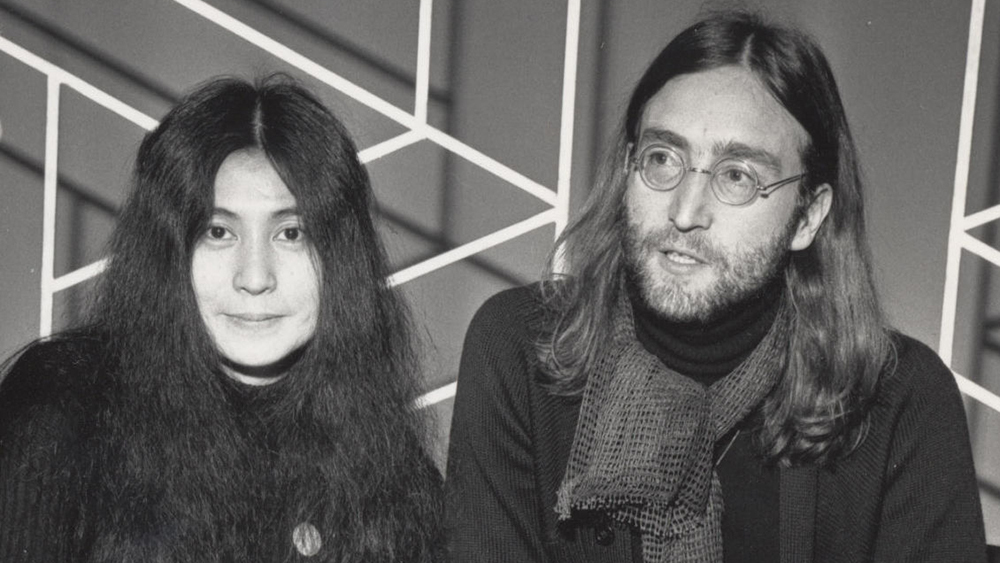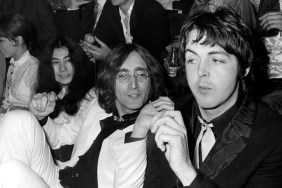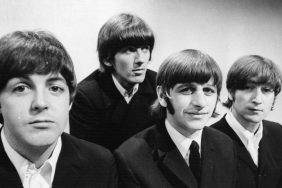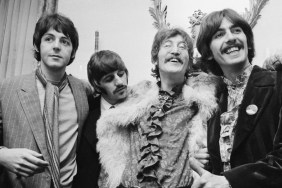‘Give Peace a Chance’, John Lennon’s first single outside of The Beatles, turns 50 this year. It was recorded on a four-track tape recorder backed by a chorus of celebrities and journalists during John and Yoko Ono’s bed-in for peace at the Queen Elizabeth Hotel in Montreal.
The song represented John and Yoko’s budding musical partnership. The next five years were an incredibly prolific time for the pair, giving rise to a number of solo records and collaborative projects. Some of what they created is timelessly beautiful and some of it profoundly strange. Let’s take a look at both.
‘Revolution 9’, The Beatles (1968, The Beatles)
John and Yoko’s first three records – Two Virgins, Life With the Lions and The Wedding Album – were avant-garde experimental recordings. They weren’t the least bit concerned with listenability and consequently failed to muster much critical or commercial approval.
Around the same time as Two Virgins, John contributed the eight-minute sound collage, ‘Revolution 9’, to The Beatles’ White Album.
Yoko’s influence is stamped all over ‘Revolution 9’, as well as that of post-war musique concrète. The Beatles’ most experimental track consists of manipulated tape loops and chopped up vocal samples from the EMI sound archives. George Harrison assisted in its creation, while John and Yoko pieced together the final edit.
The Beatles might’ve been the biggest pop stars the world had ever seen, but ‘Revolution 9’ wasn’t exactly met with open arms. But no matter your opinion on its quality or level of pomposity, it’s a fascinating experiment that revealed John’s eagerness to escape the confines of the group.
‘Don’t Worry Kyoko (Mummy’s Only Looking for Her Hand in the Snow)’, Fly (1971, Yoko Ono)
The Plastic Ono Band premiered ‘Don’t Worry Kyoko’ at the Toronto Rock and Roll Festival in September, 1969. The song is rooted in a blues rock guitar riff and Ringo Starr’s uptempo rock drumming. Nothing too unconventional, you might think, but Yoko’s lead vocals made it an exceptionally polarising phenomenon.
The lyrics stretch no further than the words, “don’t worry,” but Yoko communicates the incommunicable through rife wailing and screeching. Her primitive performance conveys the pain and fear caused by her ex-husband, Anthony Cox, fleeing with their daughter, Kyoko.
‘Instant Karma!’, Single (1970, Lennon/Ono with the Plastic Ono Band)
‘Instant Karma!’ is famous for being written, recorded and released in just over a week. Bands can execute a similar thing these days thanks to the internet, but you probably had to be a member of The Beatles to make it happen in early 1970. Mr Wall of Sound, Phil Spector, produced ‘Instant Karma!’, but it’s a rough-edged recording that features George Harrison on guitar, Billy Preston on organ, and Yoko on backing vocals.
The production captures a sense of spontaneity, which adds to the song’s anthemic quality. John’s lyrics argue we’ll all be made accountable for our actions and that only through peaceful togetherness can we all shine on.
‘Hirake’ aka ‘Open Your Box’, Fly (1971, Yoko Ono)
With lyrics like, “Open your box / Open your trousers / Open your thighs / Open your legs,” Yoko’s ‘Power to the People’ B-side ‘Hirake’ (aka ‘Open Your Box’) was a lightning rod for controversy when it came out in 1971.
The risqué lyrics are matched by a freak-funk groove earmarked by Klaus Voormann’s winding bass riff and Lennon’s laser gun guitar work. Yoko wasn’t yet inclined to write neat melodies, but ‘Open Your Box’ is a spectacular piece of lyrical provocation that you can dance to.
‘Imagine’, Imagine (1971, John Lennon)
In contrast to some of the uncooked political music of his early solo career, ‘Imagine’ is a gentle piano ballad that finds John at his most musically and lyrically succinct. Its presentation was so friendly that it became his best-selling solo single.
“Because it is sugarcoated, it is accepted,” John said of ‘Imagine’. “Now I understand what you have to do – put your political message across with a little honey.”
Not long before his death, John gave Yoko credit for some of the song’s lyrics and concept, and it is particularly reminiscent of her 1964 art book, Grapefruit. In 2017, Yoko was finally legally recognised as a co-writer.
‘Mrs. Lennon’, Fly (1971, Yoko Ono)
Yoko gave a speech at Harvard University’s International Feminist Conference in 1973 detailing mainstream society’s reductive treatment of her: “What I learned from being with John is that society suddenly treated me as a woman who belonged to a man,” she said. “I was lucky I was over 30 and it was too late for me to change.”
She addresses similar themes on 1971’s ‘Mrs. Lennon’, with lines likes “Half the world is always killed you know… Half the world is always dying you know,” illustrating her frustration at being forced to dwell in her husband’s shadow.
As if in defiance of the common criticisms of her music – that it was too noisy, too unkempt – ‘Mrs. Lennon’ is a neatly manicured minor-key ballad that features John on accompanying piano.
‘Woman Power’, Feeling the Space (1973, Yoko Ono)
Feeling the Space, Yoko’s 1973 record, is a searing feminist treatise that contains some of the strongest and to the point songwriting of her career. John plays guitar on a couple of tracks, including the thunderous late album highlight, ‘Woman Power’.
Yoko pulls no punches while visualising the coming age of feminine society: “Two thousand years of male society / Laying fear and tyranny / Seeking grades and money / Clinging to values vain and phony.”
‘Beautiful Boy (Darling Boy)/Beautiful Boys’, Double Fantasy (1980, John Lennon and Yoko Ono)
John and Yoko split up in 1973 and stayed apart for 18 months. After rekindling their relationship, they had their first and only child, Sean Taro Ono Lennon. They didn’t release any new music until 1980’s Double Fantasy, where they took the reins on seven songs a piece. There are scant thematic links between their respective contributions, aside from the dyad of John’s ‘Beautiful Boy (Darling Boy)’ and Yoko’s ‘Beautiful Boys’, which both speak directly to their son.
‘Beautiful Boy’ made the bigger impact and includes one of John’s most famous lines: “Life is what happens to you while you’re busy making other plans.” Although the song is explicitly sentimental, it demonstrates John’s enduring pop smarts – Paul McCartney rates it as one of his favourite Lennon compositions.
‘Walking On Thin Ice’, Single (1981, Yoko Ono)
A lot of mythology surrounds ‘Walking On Thin Ice’. John’s lead guitar parts are supposedly the last sounds he committed to tape. It’s also been speculated that he was holding the master recording when he was shot on December 8, 1980. The Yoko original was released one month later and became her first solo chart hit, which would’ve been justified irrespective of the circumstances.
‘Walking On Thin Ice’ is easily one of the best songs from the pair’s collaborative oeuvre. It’s been numerously covered and remixed, but the post-disco original is supreme, inserting Yoko’s experimental flair and playful philosophies into a finely sculpted pop song.












